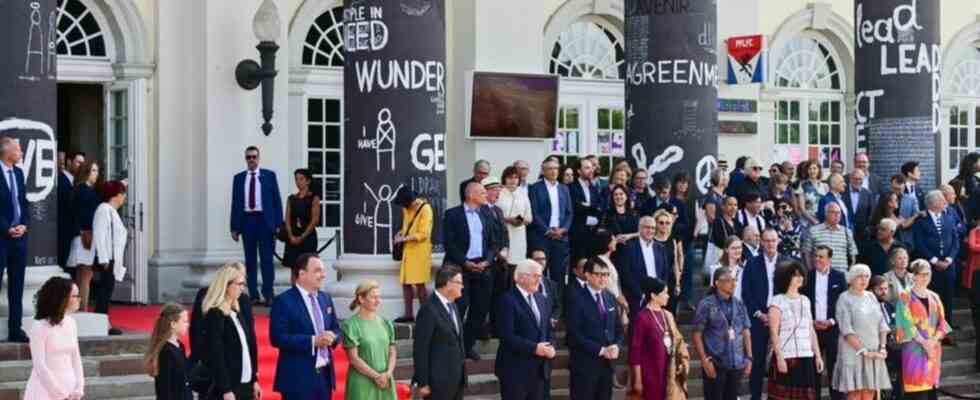It is one of the world’s most important shows of modern art: the documenta has begun. In the face of a smoldering anti-Semitism debate, Federal President Steinmeier speaks about the limits of artistic freedom.
At the opening of the documenta world art exhibition in Kassel, Federal President Frank-Walter Steinmeier pointed out the limits of artistic freedom.
“I want to be frank: I wasn’t sure in the past few weeks whether I would be here today,” he said in his opening speech on Saturday, referring to the anti-Semitism debate about this year’s show.
The Indonesian curatorial collective Ruangrupa was accused of involving organizations that supported the cultural boycott of Israel or were anti-Semitic. Seldom has a documenta triggered such a fierce and critical debate as this year’s, said Steinmeier.
About the limits of artistic freedom
“We all know that art cannot be bought without a hitch,” he emphasized after a tour of some of the exhibition rooms. Artistic freedom is an important pillar of democratic societies, but it also has its limits. “Art can be offensive, it should trigger debates,” said Steinmeier.
Criticism of Israeli policy is allowed. “But where criticism of Israel turns into questioning of its existence, the limit has been crossed.” In the run-up to the show, he observed “some thoughtless, careless dealings with the State of Israel,” he said. In Germany, however, the recognition of Israel is the basis and prerequisite for the debate.
Steinmeier opened the documenta fifteen in bright sunshine and with summer temperatures already in the morning. Hundreds of people had gathered in front of the Fridericianum in downtown Kassel for his arrival.
Anti-Semitism officer criticizes makers
The federal government’s anti-Semitism commissioner, Felix Klein, continued to criticize those responsible for the documenta after the opening. Klein told the “Bild am Sonntag”: “Those responsible for the Documenta have not been able to credibly dispel the allegations of anti-Semitism. I very much regret that, especially after the heated public discussion about this.”
Klein, who has been the Federal Government Commissioner for Jewish Life in Germany and the fight against anti-Semitism since 2018, said: “I share the Federal President’s critical assessment. It cannot be that anti-Semitism is part of the publicly funded artistic discourse in Germany.”
“Do not tolerate anti-Semitism”
Hesse’s Prime Minister Boris Rhein (CDU) also emphasized that he takes the accusation of anti-Semitism very seriously. “German politicians can’t just say nothing without saying anything when the perpetrators of the Shoah are accused of anti-Semitism in the country,” he emphasized. That should alarm. “Anyone who wants a free and liveable country cannot tolerate anti-Semitism.” This also applies to “the secret varieties of Israel criticism as substitute anti-Semitism”.
Those who were born later would not have been responsible for what happened in Germany at that time, but they would have taken responsibility for ensuring that such things never happen again. “When I say that art and culture are free under our constitution, I’m also saying that our country’s culture also includes unconditional support for Israel’s right to exist and against anti-Semitism.”
Against the background of the political debate surrounding documenta fifteen, the opening day was accompanied by smaller rallies by pro-Palestinian and pro-Israeli groups.
Every five years
The documenta, which has been in Kassel since 1955, is considered the world’s most important exhibition of contemporary art alongside the Venice Biennale. It is only held every five years. For the 15th edition, the curating collective Ruangrupa has selected 14 collectives, organizations and institutions as well as 54 artists. They invited other colleagues. According to the organizer, a total of 1500 artists are represented.
This year, the 100-day exhibition is spread over 32 locations in the Kassel districts of Mitte, Nordstadt and Bettenhausen as well as on and on the Fulda with adjacent areas such as Karlsaue or Hafen. In addition to the classic venues such as the Museum Fridericianum and the documenta hall, there is a boat rental, a former company site and an old indoor pool. According to general director Sabine Schormann, a total of 30,000 square meters will be used.
This year’s documenta represents the Global South. The focus is not on the work, but on art as a collective process.
What is Lumbung?
The concept of the Ruangrupa collective is based on the Indonesian Lumbung architecture. In the island state, “lumbung” is the word for a communal rice barn in which the excess harvest is stored for the benefit of the community. The artistic direction wants to transfer this tradition of sharing to the world art exhibition in Kassel.
“I also see lumbung and collective practice as inspiration,” said Prime Minister Rhein, who visited the show together with Federal President Steinmeier and Minister of State for Culture Claudia Roth (Greens). “A little more shared “rice barn” would be good for one or the other political position in case of doubt.”
The show lasts until September 25th. The day ticket costs 27 euros.

